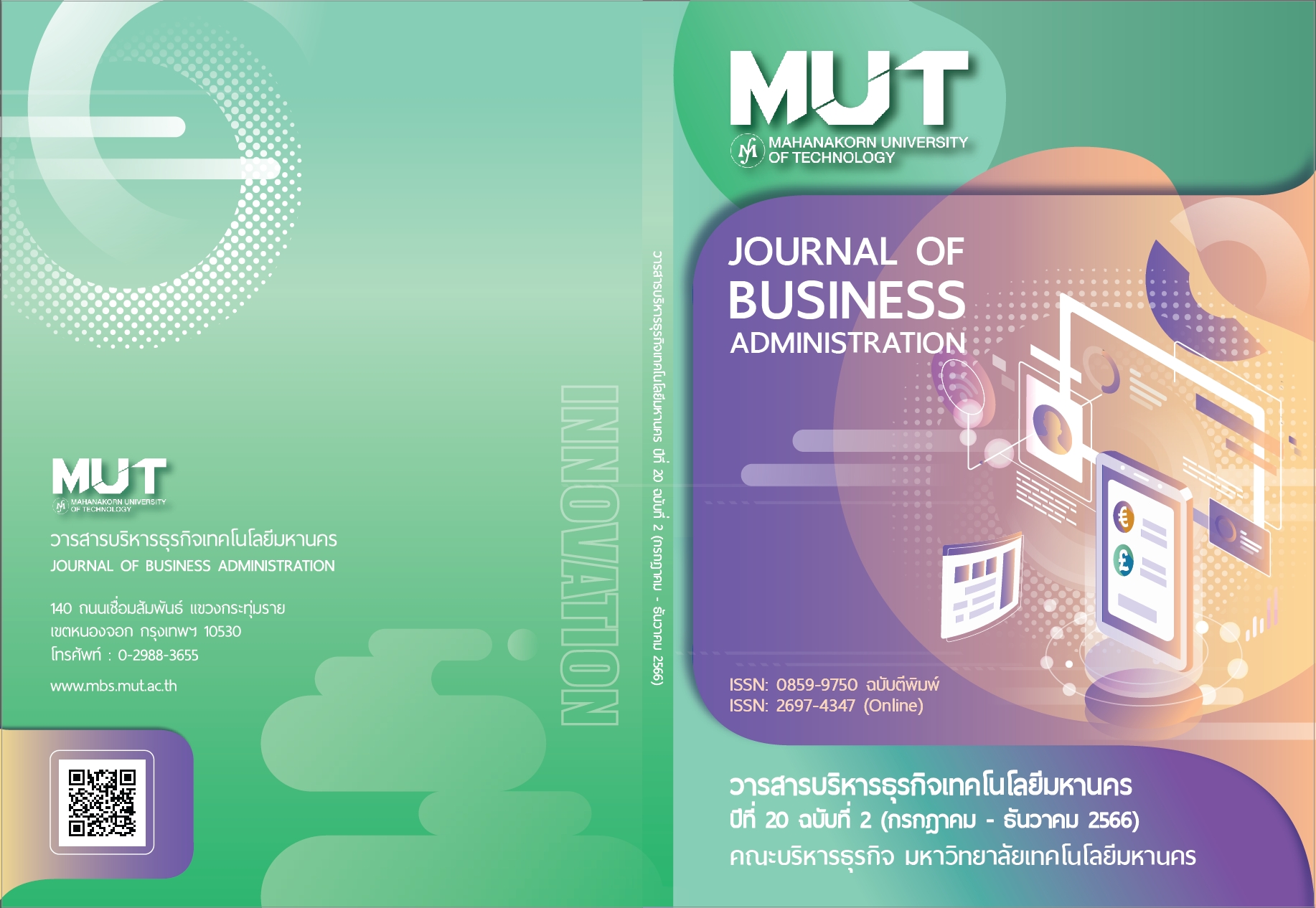Technology Adoption and Intention to Use Electric Car Technology of Consumers in Bangkok
Keywords:
Technology Adoption×Electric Car Technology×Abstract
The main objectives of the research were to (1) study factors affecting electric car technology adoption of consumers in Bangkok and (2) study relation between factors affecting technology adoption and intention to use electric car technology. The research data were collected from 400 consumers in Bangkok through car showrooms in 5 districts which were selected by simple random sampling method from 50 districts. The two showrooms from the retrieved districted were then randomly selected. The respondents were then accidentally selected from the customers who visited those showrooms.
The primary research tool was a closed-ended questionnaire. Descriptive and reference statistics were used for data analysis. The relationship between factors affecting electric car technology adoption and intention to use electric car technology was analyzed using Multiple Linear Regression. The path analysis was investigated using Multiple Regression Method to observe the total effect of factors affecting electric car technology adoption on intention to use electric car technology. The hypothesis test was conducted at the significant level of 0.05.
The results revealed that the majority of consumers was female, about 31-40 years old, had a bachelor’s degree with the average income higher than 40,000 Baht. Factor that had the highest perception level on technology adoption was “perceived ease of use”. Hypothesis test result upon relation between factor affecting technology acceptance and attitude toward technology usage revealed positive relationship for every factor except for facilitate condition that the revealed negative relationship. Factor that had the high level of influence on intention to use electric car was “attitude towards technology usage”, “perceived risk and utilization”, and “perceived ease of use” respectively.
References
Almeida e Sousa, E. 2019. Evaluating the Market for Electric Vehicle (EV) Using Technology Acceptance Model. Thesis. Master of Science in Industrial Engineering and Management. Tecnico Lisbo.
Ajzen, I. 1985. From intentions to action: A theory of planned behavior. In: J. Kuhl & J.
Beckman, eds. Action control: From cognitions to behaviors. New York: Springer.
– 39.
Ajzen, I. 1991. The theory of planned behavior. Organizational behavior and human decision processes. Vol. 50. No. 2. 179 - 211.
Ambak, K. et al. 2016. Driver Intention to Use Electric Cars Using Technology Acceptance Model. ARPN Journal of Engineering and Applied Sciences. Vol. 11. No. 3. 1524 - 1528.
Camarero, C., Anton, C. and Rodriguez, J. 2013. Technological and ethical antecedents of
e-book piracy and price acceptance. Journal of the Electronic Library. Vol. 32. No. 4. 542 - 566.
Chau, P. Y. 1996. An Empirical Assessment of a Modified Technology Acceptance Model. Journal of management information systems. Vol. 13. No. 2. 185 - 204.
Cui, G., Bao, W. and Chan, T. 2009. Consumers’ adoption of new technology products: the role of coping strategies. Journal of Consumer Marketing. Vol. 26. No. 2. 110 – 120.
Davis, F. D. 1989. Perceived usefulness, perceived ease of use, and user acceptance of
Information technology. Management Information System Quarterly. Vol. 13. No. 3. 319 - 340.
Department of Land Transport, 2023. Number of New Car Registered in 2023. Retrieved September 29, 2023 from https://web.dlt.go.th/statistics/
Department of Provincial Administration. 2023. Population Statistic. Retrieved October 1, 2023 from https://stat.bora.dopa.go.th/stat/statnew/statyear/#/TableTemplate/Area/statpop
Dinudom, V. 2019. Technology Acceptance and Intention to Use Electric Car of Consumer
in Bangkok and Perimeter in Thailand. Independent Study. Master of Business
Administration. Thammasat University.
Everitt, B.S. and Skrondal, A. 2010. The Cambridge Dictionary of Statistics. 4th Ed. Cambridge University Press. New York. Retrieved September 10, 2023 from https://www.stewartschultz.com/statistics/books/Cambridge%20Dictionary%20Statistics%204th.pdf
Fishbein, M. and Ajzen, I. 1975. Belief, attitude, intentions and behavior: An introduction to theory and research. Boston. MA: Addison-Wesley.
Fishbein, M. and Ajzen, I. 2011. Predicting and changing Behavior. The Reasoned Action
Approach. New York: Psychology Press. Retrieved September 10, 2023 from
https://doi.org/10.4324/9780203838020
Igbaria, M. et.al. 1995. Testing the Determinants of Microcomputer Usage via a
Structural Equation Model. Journal of Management Information Systems. Vol. 11. No. 4. 87 - 114.
Intergovernmental Panel on Climate Change. 2023. AR6 Synthesis Report on Climate Change 2023. Retrieved September 15, 2023 from https://www.ipcc.ch/report/ar6/syr/resources/spm-headline-statements/
Jaiwat, W. 2023. Krungsri Auto Revealed 5 Groups of Electric Car Loan Customer: High
Income Customer Shared More Than 50% of Portfolio. Positioning. Retrieved September 15, 2023 from https://positioningmag.com/1434309
Kasikorn Research Center. 2023. Sales Volume of BEV in 2023 May Reach 50,000 Units. Retrieved September 20, 2023 from https://www.kasikornresearch.com/th/analysis/k-econ/business/Pages/BEV66-CIS3384-01-03-2023.aspx
Leangchan, R. 2022. Electric Car: Demand and Upcoming Opportunity. Krungsri Research. Retrieved October 2, 2023 from https://www.krungsri.com/th/research/research-intelligence/ev-survey-22
Leelaphatthanawong, P. and Pinvanichkul, T. 2019. Factor influencing Innovation and Technology Acceptance: A Case Study of Electric Vehicle; Personal Car with No More than 7 seats. Journal of Research and Development: King Mongkuts University of Technology Thonburi. Vol. 42. No. 2. 129 - 144.
Ma, Q. and Liu, L. 2004. The Technology Acceptance Model: A Meta-Analysis of Empirical Findings. Journal of Organizational and End User Computing. Vol. 16. No. 1. 59 - 72.
Manutworakit, P. and Choocharukul, K. 2022. Factors Influencing Battery Electric Vehicle Adoption in Thailand—Expanding the Unified Theory of Acceptance and Use of Technology’s Variables. Sustainability. Vol. 14. 8482.
McFarland, D. J. and Hamilton, D. 2006. Adding Contextual Specificity to the Technology
Acceptance Model. Computers in human behavior. Vol. 22. No. 3. 427 - 447.
Minal and Sekhar, Ch. R. 2022. Analyzing Factors for Electric Vehicle Adoption in India: CRITIC - TAM approach. Social Science Research Network (SSRN). Retrieved October 2, 2023 from https://papers.ssrn.com/sol3/papers.cfm?abstract_id=4113889
National Science and Technology Development Agency. 2017. Study Report on Electric Vehicle Industry. Retrieved October 2, 2023 from https://waa.inter.nstda.or.th/prs/pub/EV.pdf
Özdemir Ö., N. and Barutçu, S. 2022. Comparing Technology Acceptance for Electric Vehicles – A Comparative Study in Turkey and Germany. International Journal of Contemporary Economics and Administrative Sciences. Vol. 12. No. 2. XII. Issue: 2. 898 - 917.
Park, E. and Kim, K. J. 2014. An integrated adoption model of mobile cloud services: Exploration of key determinants and extension of technology acceptance model. Telematics and Informatics. Vol. 31. No. 3. 376 – 385.
Pishchenko, V. and Myriounis, A. 2016. Consumer’s Acceptance of New Technology: An Ethnographic Study on Self Driving Automobile. Master Thesis. Department of Business Studies Uppsala University.
Puean-nguleum, S. 2018. การศึกษาการยอมรับรถยนต์ไฟฟ้าในประเทศไทย. Independent
Study. Master of Management. Mahidol University.
Rogers, E.M. 2003. Diffusion of innovations. 5th Ed. New York: Free Press.
Sharma, S.K. and Sharma, M. 2019. Examining the role of trust and quality dimensions in the actual usage of mobile banking services: An empirical investigation. International Journal of Information Management. Vol. 44. 65 - 75.
Shrestha, N. 2020. Detecting Multicollinearity in Regression Analysis. American Journal of Applied Mathematics and Statistics. Vol. 8. No. 2. 39 - 42.
Stevens, J. 1996. Applied statistics for the Social Sciences. 3rd Ed. Lawrence Erlbaum Associates. Hillsdale. New Jersey.
Turner, R.C. and Carlson, L. 2003. Indexes of Item-Objective Congruence for Multidimensional Items. International Journal of Testing. Vol. 3. No. 2. 163 - 167.
Venkatesh, V. and Davis, F. D. 2000. A Theoretical Extension of the Technology
Acceptance Model: Four Longitudinal Field Studies. Management Science. Vol.
No. 2. 186 - 204.
Venkatesh, V. et al. 2003. User Acceptance of Information Technology: Toward a Unified
View. MIS Quarterly. Vol. 27. No. 3. 425 – 478.
Yamane, T. 1973. Statistics: An Introductory Analysis. 3rd Ed. New York: Harper
and Row.
Yousif, R.O. and Alsamydai, M.J. 2019. Perspective of Technological Acceptance Model toward Electric Vehicles. International Journal of Mechanical and Production Engineering Research and Development (IJMPERD). Vol. 9. No. 5. 873 – 884.
Downloads
Published
Issue
Section
License

This work is licensed under a Creative Commons Attribution-NonCommercial-NoDerivatives 4.0 International License.
ข้อความ ข้อคิดเห็น ข้อมูล เนื้อหา รูปภาพ แผนภูมิ แผนผัง เป็นต้น ที่ปรากฏและแสดงในบทความต่างๆ ในวารสารบริหารธุรกิจเทคโนโลยีมหานคร ถือเป็นความรับผิดชอบโดยตรงของผู้เขียนบทความนั้นๆ มิใช่เป็นความรับผิดชอบใดๆ ของวารสารบริหารธุรกิจเทคโนโลยีมหานคร และมหาวิทยาลัยเทคโนโลยีมหานคร
บทความที่ตีพิมพ์ในวารสารบริหารธุรกิจเทคโนโลยีมหานคร ถือเป็นลิขสิทธิ์เฉพาะของคณะบริหารธุรกิจ มหาวิทยาลัยเทคโนโลยีมหานคร หากบุคคลหรือหน่วยงานใดต้องการนำทั้งหมดหรือส่วนใดส่วนหนึ่งไปเผยแพร่ต่อหรือเพื่อกระทำการใดๆ จะต้องได้รับการอนุญาตเป็นลายลักษณ์อักษรจากคณะบริหารธุรกิจ มหาวิทยาลัยเทคโนโลยีมหานครก่อนเท่านั้น


